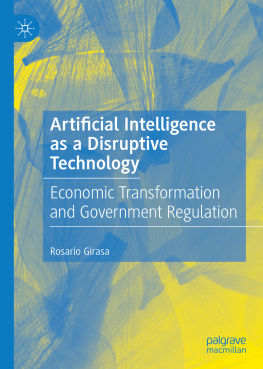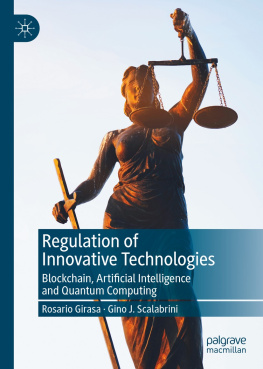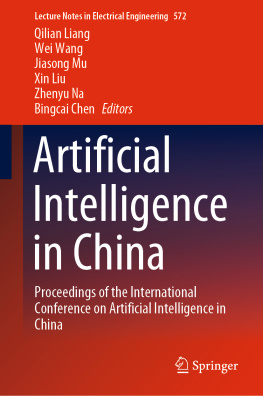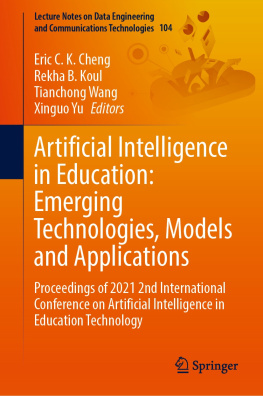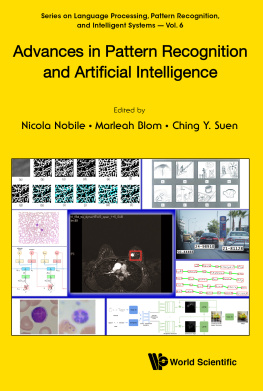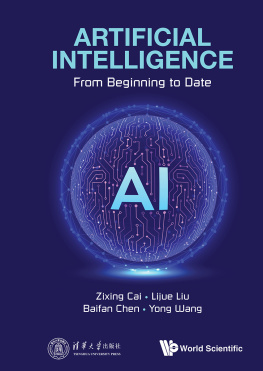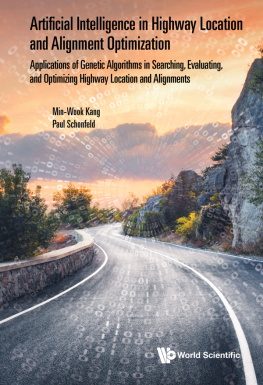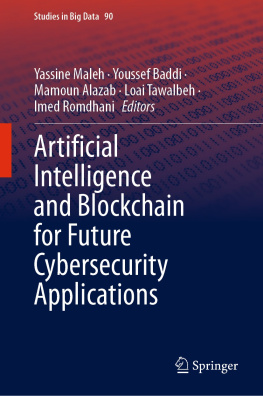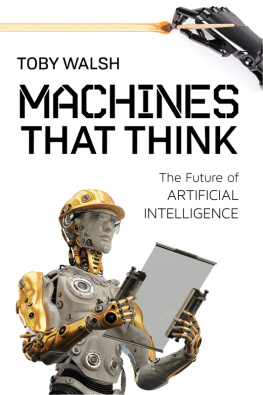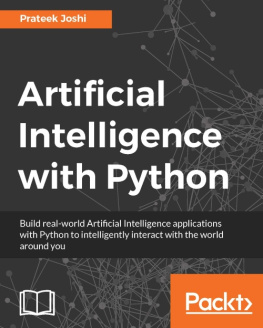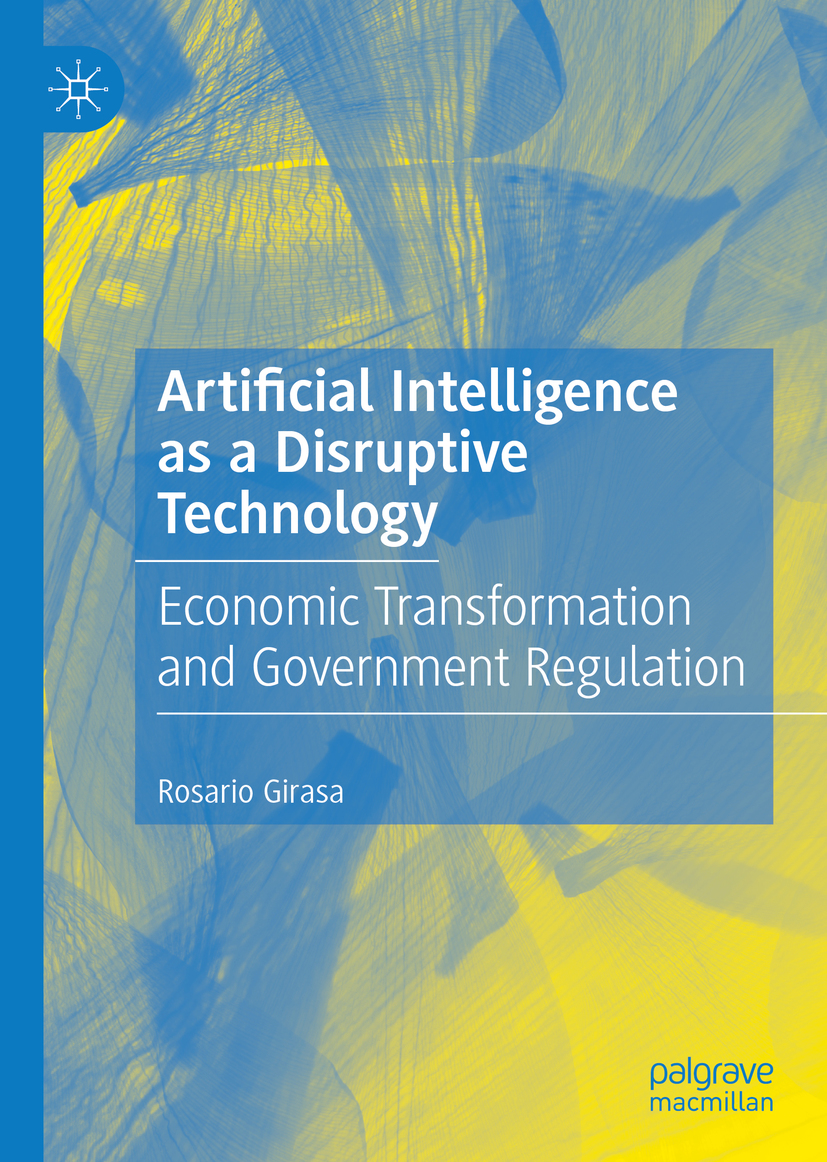Rosario Girasa
Artificial Intelligence as a Disruptive Technology
Economic Transformation and Government Regulation
Rosario Girasa
Goldstein Academic Center 203, Pace University, Pleasantville, NY, USA
ISBN 978-3-030-35974-4 e-ISBN 978-3-030-35975-1
https://doi.org/10.1007/978-3-030-35975-1
The Editor(s) (if applicable) and The Author(s), under exclusive license to Springer Nature Switzerland AG 2020
This work is subject to copyright. All rights are solely and exclusively licensed by the Publisher, whether the whole or part of the material is concerned, specifically the rights of translation, reprinting, reuse of illustrations, recitation, broadcasting, reproduction on microfilms or in any other physical way, and transmission or information storage and retrieval, electronic adaptation, computer software, or by similar or dissimilar methodology now known or hereafter developed.
The use of general descriptive names, registered names, trademarks, service marks, etc. in this publication does not imply, even in the absence of a specific statement, that such names are exempt from the relevant protective laws and regulations and therefore free for general use.
The publisher, the authors and the editors are safe to assume that the advice and information in this book are believed to be true and accurate at the date of publication. Neither the publisher nor the authors or the editors give a warranty, expressed or implied, with respect to the material contained herein or for any errors or omissions that may have been made. The publisher remains neutral with regard to jurisdictional claims in published maps and institutional affiliations.
Cover illustration: Marina Lohrbach_shutterstock.com
This Palgrave Macmillan imprint is published by the registered company Springer Nature Switzerland AG.
The registered company address is: Gewerbestrasse 11, 6330 Cham, Switzerland
To
Susanne Marolda and Kenneth Marolda
(Mother and Son)
Former Students Who Taught the Instructor
Other Publications by Author Under Name of Roy J. Girasa or Rosario Girasa
Cyberlaw: National and International Perspectives (Prentice-Hall, 2002)
Corporate Governance and Finance Law (Palgrave Macmillan, 2013)
Laws and Regulations of Global Financial Markets (Palgrave Macmillan, 2013)
Shadow Banking: Rise, Risks, and Rewards of Non-Bank Financial Services (Palgrave Macmillan, 2018)
Regulation of Cryptocurrencies and Blockchain Technologies (Palgrave Macmillan, 2018)
Preface
I had written a book entitled Regulation of Cryptocurrencies and Blockchain Technologies, which was published in July, 2018. A former student came to my university office who told me about her position at a big-4 accounting firm which had called in all of the employed accountants and announced the firms new priorities, namely, blockchain and artificial intelligence. Both are transformative developments that will occur exponentially in the coming years. Although there are thousands of articles and many books on artificial intelligence (AI), this text is aimed at fulfilling a perceived need for the regulatory aspect of AI. The goal of this text is that it will assist in that regard.
It is almost without precedent that a subject matter encompasses the broadest spectrum of human knowledge. At first blush, AI is the emanation of the immense research, testing, and expansion of the scientific frontiers encompassing the pure sciences of physics, chemistry, and biology, utilizing the language of mathematics based in great part to the creation and exponential growth of computers. The rise of robotics brings to the forefront the social sciences which include sociological issues especially that of job losses or substitutions; economics which is profoundly affected by the effects of AI creations both nationally and globally; political science which is concerned with how governments respond to the challengers wrought by the new technologies including military uses; psychology concerning AIs effect on the many changes in jobs and social norms that new generations will experience; arts, literature, movies, and the entertainment industry in general with the many fantasies and possibilities of AI which have featured numerous works of fiction and movies of robots and other AI advances as they interrelate to human persons; philosophy, especially concerning the concept of consciousness in robots should they attain the level of superintelligence; and other areas of human knowledge.
Having attained more than eight decades of life, no other subject matter has ever intrigued this author as AI, having made research and writing totaling, engrossing, and endlessly fascinating. I truly wish upon the reader a desire to explore this area of knowledge which will profoundly affect all of our future lives.
Special thanks to Professor Victor Lopez of Hofstra University, Dr. Sharlene A. McEvoy of Fairfield University, and John Hardiman, who is an engineer and past editor of Delmar for their interest and opinions. Also special thanks to Rachael Ballard, Head of Science and Society for Palgrave Macmillan for her review, support, and furthering the production of this text; Joanna ONeill, Assistant Editor at Palgrave Macmillan for walking me through the editorial process; G. NirmalKumar for his excellent editorial assistance; and my very special program advisers at Pace University, Patricia Saviano and Suzanne DeRosa for all their invaluable assistance.
Please note. This author researched all of the material and wrote all of the words except for quotes stated in the text and, thus, all errors are those of the author. The text is not intended to offer legal advice but rather is the authors analysis and opinions based on the numerous articles, commentaries, speeches, regulations, and other materials read and downloaded in an attempt to understand the new technologies and provide a text in readable format for students, professors, and all other interested persons in the subject matter. For all personal, legal, and related questions, refer to competent counsel for up-to-date advice and suggestions.
Rosario Girasa
Pleasantville, NY
Table of Cases
Alice Corp. v. CLS Bank Intern., 573 U.S. 208 (2014)
Ariosa Diagnostics, Inc. v. Sequenom, Inc., 788 F.3d 1371 (Fed. Cir. 2015)
Arkansas v. Bates, Case No. 04CR-16-370 (Cir. Ct. Benton Cty, 2016)
Athena Diagnostics v. Mayo Collaborative, No. 17-2508, (Fed. Cir. 2019)
Bilski v. Kappos, 561 U.S. 593 (2010)
Blue Spoke, LLC. V. Google Inc., No. 16-1054 (Fed. Cir. 2016)
Burrow-Giles Lithographic Co. v. Sarony, 111 U.S. 53 (1884)
Carpenter v. U.S., No. 16-402, slip. op., 585 U.S. ____ (2018)
Cruz v. Talmadge, 244 F.Supp.3d 231 (1977)
Electric Power Group LLC. V. Alstrom S.A., 830 F.3d 1350 (Fed. Cir. 2016)
FTC v. D-Link Systems, Inc., 3:2017-cv-00039 (N.D. Ca. Jan. 5, 2017)
FTC v. Vizio, Inc., 2:17-cv-00758 (D.N.J. Feb. 6, 2017)
Gottschalk v. Benson, 409 U.S. 63 (1972)
Holbrook v. Prodomax Automation Ltd., 1:17-cv-00219-PLM-PJG (W.D. Mich. March 7, 2017)
Infopaq Intnl v. Danske Dagblades, E.C.J (17 July 2019), swarb.co.uk
In reNomi Technologies, Inc., C-4538 (Fed. Trade Com. 2015)

